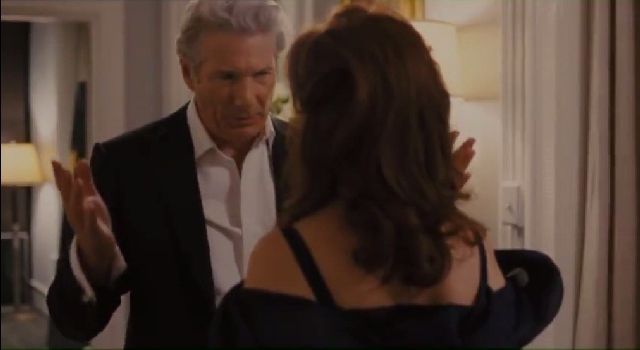Arbitrage (2012) 
“Power is the best alibi.”

Director: Nicholas Jarecki
Cast: Richard Gere, Susan Sarandon, Brit Marling
Synopsis: A troubled hedge fund magnate desperate to complete the sale of his trading empire makes an error that forces him to turn to an unlikely person for help.
At the start of first-time feature director Nicholas Jarecki’s Arbitrage, Robert Miller (Richard Gere) is a man who appears to have it all. A prosperous Hedge Fund tycoon, he has a beautiful home and is surrounded by a loving family and a wife who adores him. He is cultured and charming, and apparently grateful for the privileged lifestyle he leads. But as his story unfolds we come to learn that nothing in Robert Miller’s life is as it seems.
He’s in the midst of closing the sale of his business to a rival financier, but the buyer is stalling the deal’s conclusion and avoiding Robert. Explaining to his daughter (Brit Marling) that at 60 years old his priorities have changed and he now wants to take things easy, Robert hides the fact that he is actually forced to sell his company following the collapse of a seemingly watertight copper mine investment which has pretty much decimated his fortune. To facilitate the sale of his company, Robert has had to borrow $412 million from a financier friend to ‘plug the gap’ created by the money spent on the copper mine deal, and now that the buyer is stalling, Robert’s friend is pushing him for the return of his money.
Robert is also not quite the grateful and devoted family man he initially appeared to be. Early in the film, we see him leave the dinner party held at home in his honour to spend time with his foxy French mistress, Julie (Laetitia Castra), an artist whose latest exhibition Robert — through his company — has bankrolled. Julie is also growing increasingly impatient, and is starting to believe that he will never leave his family. To be honest, given her fiery and juvenile behaviour it probably wouldn’t be a bad thing if they went their separate ways, but Robert smooth talks her into getting away somewhere, just the two of them. They take Julie’s car, and while Julie sleeps, Robert dozes. The car spins the way they always do when the director wants an action shot for the trailer, and while Robert gets off with a cut to his head and some internal bleeding, Julie dies in the accident. Fortunately for Robert, the car wreck explodes shortly after he has stumbled away from it, meaning there is nothing at the scene to link him to the accident.
Although shaken up, Robert’s smart enough not to use his mobile phone, but instead phones Jimmy Grant (Nate Parker), the son of a former worker to whom Robert was once generous, from a petrol station and asks him to pick him up without telling anyone where he’s going. Back home, the injured Robert slides into bed next to his wife and begins the long process of worrying over whether he can keep his name out of the investigation long enough to avoid any hint of scandal queering the sale of his business. Sure enough, the very next day a suspicious cop (Tim Roth) is nosing around Robert’s swanky office asking difficult questions and subtly communicating his disbelief of the answers Robert gives him. However, it’s young Jimmy, a former offender, who comes under police scrutiny when the police trace the call from the accident scene to his number and then establish a connection between him and Robert.
Arbitrage is one of those superbly constructed thrillers that increases the tension with each twist of its plot without once straining our credulity at the way unconnected events conspire to keep Robert from achieving his aim. It’s also one of those rare movies that has us rooting for the bad guy and hissing the ‘hero’ cop. Ok, so Roth’s Detective Bryer isn’t above a little falsifying of evidence when he’s sure he’s got the right man, but his suspicions are always right on the nose and yet we never want him to succeed in the way we want the equally devious Robert to succeed. We’re all the same, Jarecki seems to be telling us, criminal and cop, distorting the truth in our quest for self-fulfillment. But Jarecki has an ace up his sleeve, a truly stunning final scene which encapsulates the entire theme of the movie — the way that nothing is the way it appears. As he stands up to make a speech at a charity dinner, Robert has lost everything that’s truly important, but he —and most everyone else in the room — is totally oblivious to the fact.
Richard Gere, in one of his best roles for years, gives a performance of quiet intensity, offering only brief glimpses of the mounting sense of frustration and desperation beneath the facade of suave self-assurance. ‘Do you think money’s going to fix this?’ Grant incredulously enquires after the depth of the trouble his good deed has earned him becomes painfully apparent. ‘What else is there?’ Robert replies with genuine bewilderment. That one four-word sentence sums him up completely and explains why, at the film’s end, he hasn’t won, even though he might believe he has (the film’s open ending leaves the audience with a terrific debating point). It’s a shame Jarecki couldn’t have found a way to provide Robert’s wife Ellen (Susan Sarandon) with a little more screen time in order to flesh out her character and make the final twist just a touch more convincing, particularly as an actress of Sarandon’s stature feels wasted in the part, but after from that minor gripe, Arbitrage is a movie that provides solid, consistent and thought-provoking entertainment.
httpv://www.youtube.com/watch?v=UmJSV9ePx7c
